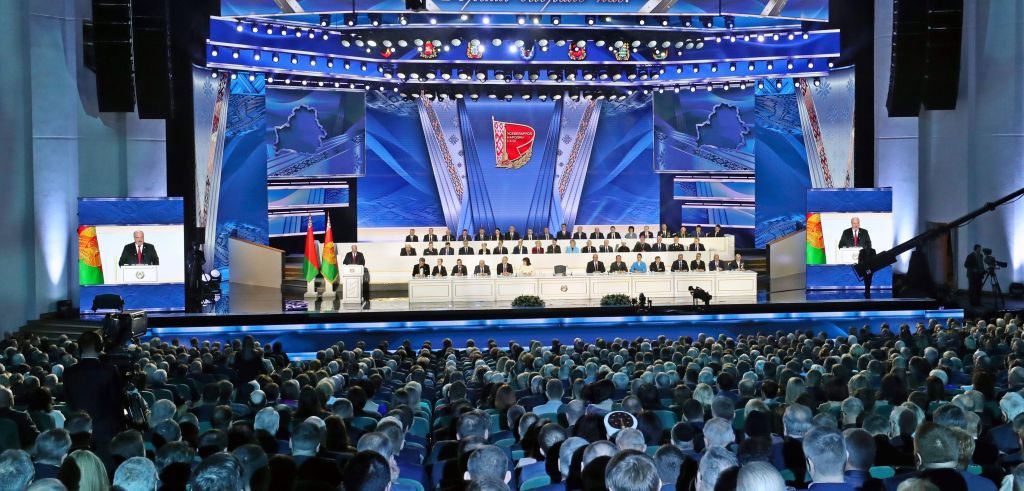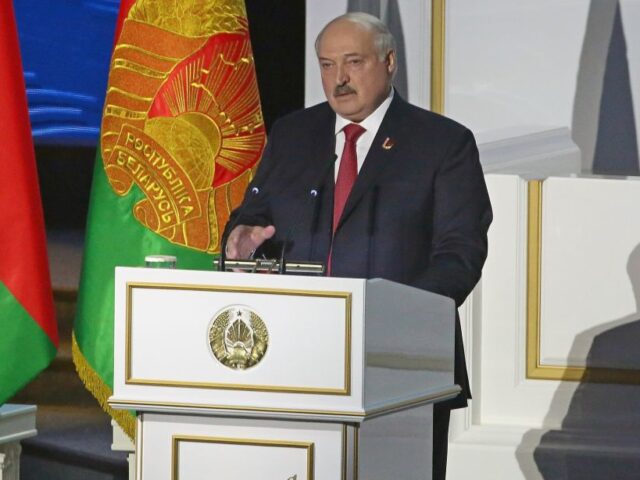NATO is turning Poland and the Baltic into a “military bridgehead” as a prelude to using “extreme military force” against Russian puppet Belarus, that country’s long-serving dictator Alexander Lukashenko has told the national ‘People’s Congress’ on Thursday.
Belarus has accused NATO of launching “combat drone” strikes against its capital and of building military bases close to their border, which Belarussian leader Alexander Lukashenko — euphemistically called a ‘strongman’ leader in reports for his extremely long time in power and disinterested approach to democracy — warned risked nuclear war.
The allegations have been rejected by Western figures as “continuous hostile provocation” and as a retrospective justification by Lukashenko for Belarus having recently acquired nuclear weapons possibly in contravention of the Treaty on the Non-Proliferation of Nuclear Weapons of 1968.
Speaking to delegates in a wide-ranging and lengthy speech, Lukashenko said “airfields, naval bases, training grounds are being improved at a rapid pace” by Poland, Lithuania, and Latvia, the three NATO countries lying to the north west of his country. Responding to this perceived aggression, the 69-year-old president who has been in power for approaching 30 years said the Belarussian army had moved combat units up ready to defy this alleged affront.

Belarusian President Alexander Lukashenko at the podium and on the screens delivers a speech during the All-Belarusian People’s Assembly in Minsk, Belarus, on April 24, 2024. Belarusian President Alexander Lukashenko was elected as the chair of the All-Belarusian People’s Assembly on Wednesday, according to local media reports. (Photo by Henadz Zhikov/Xinhua via Getty Images)
While saying “We’re not planning to fight them … We don’t need that”, Lukashenko mocked Poland for rapidly expanding its armed forces, which he claimed was needless and detrimental to their economy. He said in comments reproduced by Belarussian state media that: “We deployed a couple of battalions from Vitebsk and are now standing head-on with NATO. Battalions of full operational readiness. Ready to leave the home bases within three hours.”
One of the threats Belarus faces, he said, is from the Belarusian diaspora which fled abroad seeking work, but he claims didn’t find the West as hospitable as initially supposed. These disaffected Belarus expats are now being radicalised and armed by Western intelligence agencies and will be used to invade Western Belarus, Lukashenko claimed without immediately producing evidence. Breitbart London has asked the Belarus government for clarity on these claims.
These developments are ultimately the responsibility of the United States, the President asserted in his speech, which is alleged to be preparing military action against Belarus, broadly regarded as a Russian client state in the west. He said: “It is obvious that Poland and the Baltic countries are being purposefully turned into a military bridgehead for its possible use by NATO. Almost everything has been done to get the NATO leadership ready for a decision to use military force, including extreme military force.”
The remarks may be read with a dash of irony by European observers, who — despite Lukashenko’s insistence that “Washington is doing everything to drag our country into the conflict” — may recall he allowed Belarus to be used as a springboard for Russia to launch its re-invasion of Ukraine in 2022.
The risk of these developments, Lukashenko continued, is that Russia may feel compelled to respond to the United States, and that: “Any careless word or movement may trigger an open armed confrontation, up to the use of nuclear weapons… Russia will use the entire arsenal it has. It will be an apocalypse”.
Meanwhile, Belarus claimed it has actually already come under attack from NATO, with drone strikes launched by Lithuania that targeted the national capital, Minsk. Speaking at the same conference, Ivan Tertel, head of the Belarusian KGB said there had been “attacks by combat drones from the territory of Lithuania on objects in Minsk and its suburbs”, which his forces had allegedly managed to prevent.
Per the AP, the claims of attack drone strikes against Belarus by a NATO state were strongly rejected by the country involved, with a Lithuanian military spokesman saying: “This is nonsense; I can’t find another word.”
The Lukashenko and Tertel comments were made at the seventh Belarusian People’s Congress, the occasional assembly of around 2,500 delegates from Belarussian regions, industry, and government instituted as a substitute for a meaningful democracy.
The first congress, also led by Lukashenko, took place in 1996 after the end of the Cold War. Featuring a presidium and described as a “post-Soviet” political institution of Belarus, the nation’s electoral commission chairwoman said of the congress in 2016 that giving a few thousand hand-picked delegates from a population of nine million is essential to the state because “there is no other form of consulting directly with the people”.

COMMENTS
Please let us know if you're having issues with commenting.